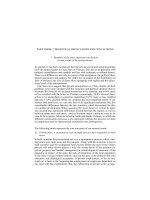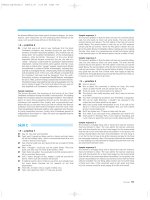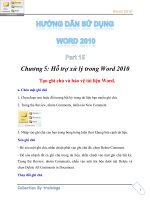Tài liệu A resource for reading and words part 15 ppt
Bạn đang xem bản rút gọn của tài liệu. Xem và tải ngay bản đầy đủ của tài liệu tại đây (216.72 KB, 15 trang )
3. Mr Suarez, who sold lottery tickets on the street to support
his family, died
4. To avoid getting a shock when you step on the scales,
you should go on a diet.
.5. She the money,and went on the trip she was dreaming
of.
READING COMPREHENSION
1. The writer's mother
A) was very careful with her money and would not waste it.
B) didn't like spending her money on presents.
C) worked as a magician.
D) enjoyed arranging surprise parties.
E) used to lock the door so that her son couldn't enter.
2. The bicycle the writer found in the room by accident
A) was quite horrible.
B) cost him a fortune,
C) didn't surprise him at all.
D) was the one he had always wanted to own.
E) was a brand-new bicycle.
3. The writer's mother somehow bought the bicycle
A) as it was really cheap
B) although it was quite expensive for her
C) since she was also fond of cycling
D) because she was able to bring down the price
E) she had just had her salary.
PASSAGE 106
THE OLD FISHERMAN
I had walked along the river many times since meeting the
fisherman that day in winter, but I did not see him again until
spring. It was late afternoon, and I had bicycled to a point
along the river about a mile downstream from where we had
met hoping to find a deserted spot to draw a picture. I found a
niche in the sloping floodwall and started drawing a junk
moored not far from me. Half an hour passed, and just as I
finished the drawing, I heard someone calling my Chinese
name. I looked down to see Old Ding scrambling up the
floodwall, his boat anchored behind him. I noticed that he
limped badly, and when he got up close I could see that one
of his legs was shorter than the other and set at an odd angle.
Such was his balance and skill in the boats that I only saw his
deformity when he came ashore.
VOCABULARY
To desert: To leave, abandon Spot: Location
To scramble up: To climb Odd : Strange
Angle: Position, perspective Niche: Place
To limp: To walk lamely Sloping: Leaning
To anchor: To moor Junk: Litter
Deformity: Abnormality, defect
To moor: To make (a boat, ship etc) secure to (ground or
buoys) by means of cables etc., to anchor
-EXERCISES
Complete the sentences with a suitable form of the words
defined above.
1. John Mellancamp found a as an accomplished
performer and composer of Mid-Western adult rock songs.
2. There were always 25 or 30 ships off the port waiting
to load.
3. She of the hedge and reached the roadside just as the
bus rolled past.
4. The horizon cleared, and the dark outline of an vessel
developed into the clear gray shape .
5. The game was barely 10 minutes old when Peter Wright
off with knee-ligament damage.
READING COMPREHENSION
1. It is obvious that the writer
A) walked with the fisher along the river many times
B) made good friends when they met
C) hasn't been able to see the fisherman all winter long again
D) was always jealous of the fisherman
E) envied the fisherman fishing in the river happily.
2. We can infer from the passage that the writer was drawing the
picture of
A) an old boat
B) the fisherman
C) the river
D) sloping floodwall
E) deserted spots
3. We understand that the writer
A) caught fish with the fisherman.
B) wanted to learn who the fisherman was.
C) knew that he didn't walk properly.
D) has only seen the fisherman in his boat out in the river before.
E) waited for the fisherman all winter long-
PASS AGE 107
The most frequent motive [for telling a white lie] was to save
face. Lying of this sort is often given the approving label of
tact, and is used when it would be unkind to be honest but
dishonest to be kind.
1
Sometimes a face-saving lie prevents
embarrassment for the recipient. The second most frequent
motivation for lying was to avoid tension or conflict
Sometimes it seems worthwhile to tell a little lie to prevent a
large conflict. You might, for example, compliment a friend's
bad work, not so much for your friend's sake but to prevent
the hassle that would result if you told the truth. The fifth
and last motive was to achieve personal power. Turning down
a last-minute request for a date by claiming you're busy can
be one way to put yourself in a one-up position.
VOCABULARY
> DEFINITIONS
Worthwhile: Meaningful, useful Motive; Reason, drive
To turn down: To refuse, to reject Tact: Skill, delicacy
Conflict: Argument, quarrel Recipient: Receiver
To save face: To avoid losing one's dignity
To compliment: To praise, to flatter
To hassle : To annoy, to disturb, to pester
> EXERCISES
Complete the sentences with a suitable form of the words
defined above.
1. Hiding from others may , but at the cost of an increased
weight of private guilt and doubt.
2. Defenceman Dixonis is the seventh of the award.
3. There are many less well known, but very places,
which I suppose need to be dealt with in another article.
4. Later, the doctor the mother on the intelligence of her
child.
5. I have been and discriminated against a number of
times just because of the way I look.
READING COMPREHENSION
1. A white lie
A) is not often approved
B) is considered to be unkind
C) does not prevent embarrassment
D) is as effective as a compliment
E) can be resorted to safely and is harmless.
2. Telling a lie by complimenting a friend on his bad work
A) causes us to hurt our friend's feelings.
B) is a good way of irritating him.
C) helps us avoid an argument with him.
D) might show us as an insincere person.
E) causes a lot of Conflicts. .
3. One of the benefits of telling a white lie is
A) getting rid of people when you are busy
B) to make yourself appear important
C) to show your power to weak people
D) telling the truth that might hurt others
E) the rude way of rejecting requests.
PASSAGE 108
WHALE HUNTING
Over a hundred years ago, when Melville wrote his famous
novel 'Moby Dick', hunting whales was a dangerous and
sometimes fatal business, now, in spite of their size, whales
are no longer an even match for men using helicopters, radar
and explosive harpoons. As a result, some species, such as the
giant blue whale, are on the verge of becoming extinct.
Although some countries gave up whaling several years ago,
there was no international agreement forbidding it until
recently, in spite of the fact that alternatives to the whale
products used in oils, cosmetics and candies were already in
existence. The whale is not the only species fighting for
survival. In the United States alone, conservationists have
estimated that over a hundred kinds of animals, fish and
birds will disappear before the end of the century unless
action is taken to protect them. Although governments in
many countries have done a great deal to control hunting and
fishing for sport and have set up game reserves and bird
sanctuaries where the species can brood safely in their natural
surroundings, the number in danger is still increasing.
VOCABULARY
> DEFINITIONS
Sanctuary: Place of safety
;
shelter Even : Equal
Giant: Huge, enormous, gigantic Match: Counterpart
To take action: To take measures Fatal: Deadly, lethal
Survival: Continuing to live To whale: To hunt whales
On the verge of: Close to, on the brink of
Reserve: Place or area for some special use or purpose
To brood: (of a bird) to sit on eggs to hatch them
Harpoon: A sharp pointed weapon thrown by hand to hunt
whales and large fish
Conservationist: Person who dedicated himself to the
prevention of loss, waste, damage of (nature)
Game: Wild animals (hunted for sport or food)
>
EXERCISES
Complete the sentences with a'suitable form of the words
defined above.
1. Smoking is a cause of 1 in every 5 heart attacks.
2. The new legislation ensures that species on the of
extinction are protected by law.
3. The duck marsh was turned into a bird
4. Poisonous waste from the factories threaten the wild
animals in the
5. If a bad decision is made, the vital thing is to recognise
that, admit it and immediate
READING COMPREHENSION
1. Hunting whales
A) is not so dangerous today
B) has always been dangerous
C) is only dangerous if the whales are very large
D) requires a lot of inexpensive equipment.
, E) used to attract men, but it does not now.
2. We understand from the passage that :
A) only a few countries still engage in whaling
B) there is no international agreement forbidding whaling.
C) whale products are the only alternative to cosmetics.
D). whaling has now been stopped by international agreement.
E) when confronted with hunters whales do not fight for
survival.
3. It is obvious that
A) governments are not conscious of the dangers threatening
certain species
B) governments in many countries were indifferent to the issue
C) government action has reduced the number of species in
danger of extinction
D) the number of species in danger of extinction is increasing in
spite of the governments' action
E) whales are now completely free from danger.
PASSAGE 109
THE CASTLE
On the coast of California, on top of a mountain, stands an
enormous castle which looks as if it has been lifted out of the
Middle Ages and laid on the site. In fact the castle, called San
Simeon, was built for the American newspaper proprietor,
William Randolph Hearst but it is furnished with objects
dating from different historical periods, which were
transported from Europe. It took thirty years to build the
castle and even then it was not completed. Throughout this
time, over a hundred workmen were permanently employed
on its site and the architect Julia Morgan, was continually
obliged to change its design, as often as Hearst changed his
mind. Rooms and whole floors were constructed but then had
to be knocked down and rebuilt to please him. Agents were
set all over Europe to find works of art to decorate the castle.
Old ceilings and fireplaces, furniture, paintings and statues
were purchased and shipped to America. An enormous
number of objects were bought but many of them could not
be used and had to be stored in warehouses, some of them not
even unpacked.
VOCABULARY
> DEFINITIONS
To lay: To put
Proprietor: Owner
To furnish with : To put furniture in
Permanently: Continuously, constantly
To oblige: To force
To construct: To build
To knock down: To destroy, to pull down
To ship: To transport
Warehouse: Store, stockroom
To unpack: To take out, to empty ovit
> EXERCISES
Complete the sentences with a suitable form of the words
defined above.
1. In that case, why do we kill the goose that the golden
eggs?
2. Mr. Osborne was the of the largest of the fifteen woolen
mills which wound their wheels in Ozleworth Brook in the
valley below.
3. His house is sparsely, rather than modestly,
4. Pepita bent back down to her work and checked off
another crate of bananas that would be to lands she had
never seen and would never see.
5. Not only must the contestants behave, but their team-
mates are also to conduct themselves properly.
READING COMPREHENSION
1. The Castle of San Simeon was
A) built by William Randolph Hearst
B)
transported from Europe
C)
furnished with works of art from Europe
D)
constructed in the Middle Ages
E)
completed in 30 years
2.
It took a long time to
build
the castle because
A)
only a hundred workers then were employed on it
B)
it was badly designed.
C)
the architect was not skilled.
D)
Julia Morgan frequently changed her mind.
E)
the owner did not know what he wanted.
3.
A large
number of works of art bought for the castle were not
used because
A)
Hearst always changed his mind
B)
there was not enough room for them
C)
they were stored in warehouses
D) they were not suitable to the design of the castle
E) they arrived long after the castle completed
PASSAGE 110
BRAIN
The human brain contains, I am told, 10 thousand million
cells and each of these may have a thousand connections.
Such enormous numbers used to daunt us and cause to
dismiss the possibility of making a machine with human-like
ability, but now that we have grown accustomed to advancing
at such a pace we can be less sure. Quite soon, in only 10 or 20
years perhaps we will be able to assemble a machine as
complex as the human brain, and if we can we will. It may
then take us a long time to render it intelligent by loading in
the right software or by altering the architecture but that too
will happen. I think it certain that in decades, not centuries,
machines of silicon will arise first to rival and then surpass
their human progenitors.
VOCABULARY
^ D£FI/vITT<9/v5
To daunt: To scare, to intimidate Pace: Speed
To load: To pvit in, to fill, to pack To rival: To compete, to vie
Decade: A period of ten years To alter: To change
To surpass: To excel, to exceed Progenitors: Ancestor
To assemble: To put together
To render: To make, to catise to be
To grow accustomed: To become used to
To advance: To move forward, to progress
To dismiss: To set aside, to think no more of
Software: Program essential to the operation of computers
> EXERCISES
Complete the sentences with a suitable form of the words
defined above.
1. Many families who get into difficulties have been
struggling with problems that would the most
energetic and resourceful of people.
2. They said time had been needed evidence.
3. When Diana once asked him what the capital of Australia
was, he was totally speechless.
4. J began my standards of hospitality, offering them my
pale, cold face when their music grew louder, when they
began laughing among themselves and didn't take the
trouble to explain their jokes to me.
5. His first formal education was received in the reading
school and at six years old he progressed to his father's
grammar school, where he quickly all his
contemporaries.
READING COMPREHENSION
1. Now the complexity of human brain ,
A) makes it impossible for us to create intelligent machines.,
(
B) causes us to dismiss the possibility of making intelligent
computers.
C) leads to our uncertainty about the ability of the machines.
D) does not discourage us to make machines with human like
ability
E) frightens us and we feel we can't achieve such a thing.
2. It is pointed out in the passage that machines with human-like
ability
A) are likely to be made in the near future
B) have almost no possibility of being made
C) are very difficult to assemble
D) need complex software
E) move faster than human beings
3. It is suggested that in the long run human beings
A) can rival intelligent machines and defeat them
B) will be able to alter the appearance of the computers
C) will be beaten by the machines they create
D) should use silicon to make efficient machines
E) can put as many cells in the machines as there are in the
human brain.
PASSAGE 1
VOCABULARY
I) lifted 2) pretext
READING
l)B 2)B
3) gift 4) conversing 5} concealed
3)C
PASSAGE 2
VOCABULARY
1) trouble 2) slaying 3) battle 4) cheat
5) dreads
3)C
PASSAGE 3
VOCABULARY
. 1) stroll 2) check
READING
1)B 2 ) E
3) wholly 4) contemplates 5) varied
3) A
PASSAGE 4
VOCABULARY
1) adapts 2) rapid 3) grumble 4) generation gap 5) after all
READING
1)D
2) A
3) A
PASSAGE 5
VOCABULARY
1) enhances 2) relied on 3) utilize 4) associations 5) eager
READING
1) E 2) B 3) D
PASSAGE 6
VOCABULARY
1) Ornament/streamers 2) bakes 3) purchased
4) impatient for 5) impatient for
READING
1)C 2)B 3) A
PASSAGE 7
VOCABULARY
1) mourners 2) saddened 3) sunk in 4) sight 5) incredible
READING
1) A 2) D 3) E
PASSAGE 8
VOCABULARY
1) apparent 2) drew on 3)tension 4) remove 5)result from
READING
1)'B 2)B 3) A
PASSAGE 9
VOCABULARY
1) take into account 2) detrimental 3} has his own way
4) unjust 5) interests
READING
1)A
2)D
3)E
PASSAGE 10
VOCABULARY
1) request 2) suffering 3) significantly 4) discrepancy 5) asserted
READING
1)A
2)E
3)C
PASSAGE 11
VOCABULARY
l)conspiracy 2) flash 3) entire 4) obtained 5) burst upon
READING
1)D
2)B
3)D
PASSAGE 12
VOCABULARY
1) significance 2) due to 3) traded 4) recovering 5) rapidly
READING
1)B 2) A 3)C
PASSAGE 13
VOCABULARY
I) comprise 2) varied 3) helping
4) tends 5) likely
READING
l)E
2) A
3)C
PASSAGE 14
VOCABULARY
I) central heating
4) electric fires
READING
1)E
2) A
2) blankets
5). lead/life
3)C
3) installed
PASSAGE 15
VOCABULARY
1) commissioned
4) landmark
READING
i)D 2)E
2) exhibition
5) attached to
3)E
3) had the heart
PASSAGE 16
VOCABULARY
1) bay 2) nasty
3) to face 4) violent 5) to put an end to
READING
2)B
3)D









